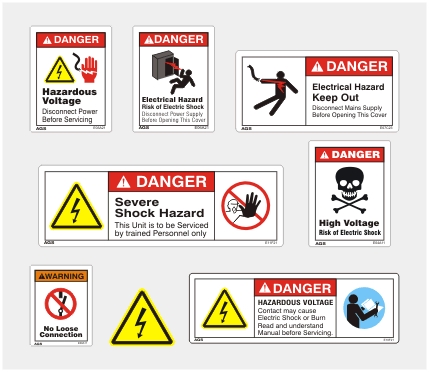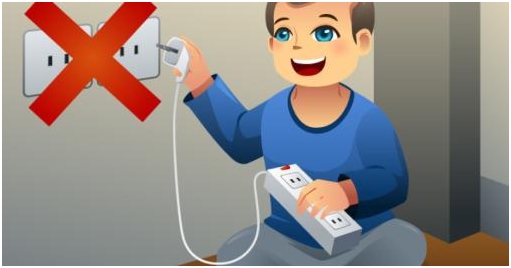Hi my fellows electrical engineers, it’s Steven Mill and today I want to deal with safety basics. So here is an article about Safety before, during and after power outage. Let me know what you think about it!
The electric power supplied to homes, factories, public places and other installations have the potential to harm the users. Even the domestic installation, which is one of the smallest, has enough current to cause death by electrocution. Other than the direct harm resulting from touching the live conductors, there are other indirect dangers such as fire hazards or accidents by moving electromechanical parts.

Electrical safety signs | image : mfgtrade
The nature of the danger posed by the electricity depends on various factors. Unlike the standard safety precautions during the normal electricity supply, the safety precautions before, during and after a power outage may differ from one situation to the other. This may also be influenced by the duration of the outage, the cause and environmental factors such as flooding, earthquakes and others.
Safety before the electric power interruption
Recommended usage and precautions
During the normal operation, observe all the necessary safety precautions associated with electricity. Use recommended installation procedures and accessories, use the right equipment and ensure any broken item is repaired and maintained as per the standards. Consumers should maintain their electrical equipment and installations in order to prevent dangers such as fires and electric shocks. Visual inspections and appropriate tests should be carried out regularly.
- Ensure that all your equipment and installation is sound. No exposed conductors and if any call a professional electrician to repair these.
- Avoid touching the live conductors
- Switch off all equipment not in use from the wall socket, or better still, unplug from the wall.
- Do not leave electrical equipment such as ironing box, heaters and other dangerous equipment unattended. This could cause a fire or burn someone else in the household.
- Remove all tools such as grinders, drilling machines from the socket after every use.
- If you experience unstable power most of the times, consider protecting your computers, DVD players, and TVs and other sensitive electronics with a surge protected power bar.

image: http://safetysystems.com.ng
Prepare for the a power outage
A power outage or blackout refers to the short-term or long-term loss of electricity supply. The nature of the power outage depends on the cause and how fast this is rectified. Some outages may take days to fix, especially if the substations and transmission lines are damaged.
Since you do not know when the outage will occur apart from when there is a scheduled interruption, be prepared all the times. This ensures that you are safe in the event that an outage occurs. Some of the precautions to take include having;
- Emergency lighting, candles, rechargeable lights, etc. keep these in a place where anyone can reach them with ease during a blackout.
- Ensure that the electric gate or doors have a manual operation mode. If anticipating the outage, switch all of them to manual.
- If you have a backup generator or inverter, ensure that they are functioning and have the fuel or fully charged batteries respectively.
- Always keep a torch with good batteries within reach.
- Enough fuel in the car just in case the fuel stations are affected
- Enough firewood or gas heaters just in case you require to heat the space.
- Heat water and cook in advance. Keep the hot liquids thermal flasks and cover the food with thermal covers.
- Your phones fully charged
Safety during the electric power outage
- Check if you are the only one affected, confirm that the circuit breakers have not tripped. If there is nothing wrong with your installation, report the outage to the utility company.
- Turn off all electrical appliances and tools, electronic equipment, computers and any other load connected to power. Turn off these from the wall sockets or unplug them if possible. This prevents equipment damages from power surges during the power restoration. In addition, this reduces the load on the power lines during the restoration exercise. You leave one light to show you when the power is back.
- If you have a backup generator or battery-based inverter, ensure that their installation and usage complies with the manufacturer’s guidelines. Engage a qualified electrician to install the systems and ensure that the power goes through approved transfer panel and switch.
- Operate the generator outdoors
- If the installation is not done to accommodate the generator, connect the loads directly to the generator using properly rated extension cords.
- If is a major problem, switch off the main switch.
- Do not open the fridge, freezer or cold rooms unless it is absolutely necessary. This will ensure that any perishables will continue to be fresh during the outage.
Safety after a power outage
- When the power resumes, you may need to observe it for a few minutes before turning on your most sensitive equipment. In some cases, the power is usually unstable immediately after it has resumed. If there are faults along the lines, the voltage may be lower than normal and some equipment such as motors may try to draw more current which can damage the windings. Therefore, wait for the power to stabilize before turning on everything.
- To be safe do not turn on all your electrical appliances, instead start with only those that you need and those that are not very sensitive. While at it, it might be a good idea to first confirm that the equipment are still operation and that they were not damaged by the interruption. Switch on the equipment one by one and remove the in operational equipment so that they can be checked by a qualified professional.
- Reset the equipment clocks and other settings that may have lost their timings or memory due to the failure. Check the timers for the sprinkler system, alarms, clocks, swimming pool pump, security lights and more.
- Check the food stored in the fridge for signs of spoilage, and throw away if spoilt.
Ensure that the hot water system is full before powering it on. - If there was flooding, do not enter flooded areas such as the basement until you are certain that all the power is turned off.
- Have all the flooded electrical appliances, panels, switch boxes, outlets and any connection checked and cleaned before using them.
Conclusion
Electricity plays a very big role is our lives, from powering our electronics, phones and other domestic equipment, to medical, manufacturing and public utilities.
Despite its positive contribution, there are several dangers associated with the electricity, and especially when there are faults or when people do not observe safety measures. Consumers should be aware of the dangers that arise from incorrect usage, faulty machines, outages as well as environmental factors such as floods.
Steven Mill.
Thanks Steven. Now let him know now what you think about his article in the comments. Does it lack information? Feel free to add more!
This is a brilliant blog.. Very interesting points.. Thanks for Sharing..